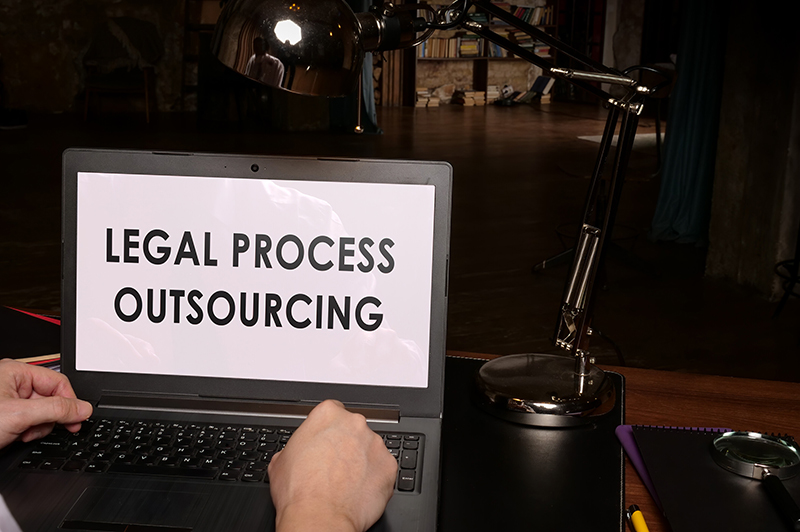Law firms all over the world are looking for ways to improve the efficiency of legal processes and ensure that all lawyers on staff can get things done smoothly. Legal process outsourcing can help them achieve these goals. This procedure breaks down different areas of law and determines the most cost-effective ways to lower all associated costs. According to a report by MarketWatch, the global Legal Process Outsourcing (LPO) market size is projected to reach USD 54780 million by 2026, from USD 10560 million in 2020, at a CAGR of 31.6% during 2021-2026. Many industry experts believe that LPO opens up new opportunities for those who can use it to its full advantage. It is best to reach out to legal process outsourcing services to meet your LPO requirements at affordable rates and improve productivity and efficiency.
Legal process outsourcing helps corporate legal departments and law firms with benefits such as improved quality of work, high security standards and stringent confidentiality policies. Staying current with legal tech trends is important to spot potential threats and find new opportunities. According to a recent report, lawyers using legal technology like a CRM and client intake software earned 40% more revenue per lawyer compared to four firms that did not utilize these technologies.
Here are 8 legal tech trends to watch in 2022:
- Legal Automation: Automation has taken over almost all industries as it helps to cope with huge volumes of work. Automation technology eases repetitive and mundane work. Modern legal automation is divided into no-code automation and low-code automation. No-code automation refers to the use of digital applications using no lines of code and is ideal for basic stand-alone applications. Low-code automation uses minimal coding and is ideal for complex and customizable systems, which function through variables and conditions and may need to be incorporated with other systems within the organization. Both types of automation come with savings in time, costs and resources, in addition to the flexibility and scalability of the processes.
- Document or Contract Automation: Some of the most popular legal tech solution developments in the legal sector include contract and document automation. They are highly flexible and can be integrated with other systems, and can be constructed using low-code and no-code automation. As a result, different functions might use them to address a variety of problems, save time, decrease risk, and increase efficiencies. Departments such as HR, procurement, compliance and risk, as well as legal, can all benefit from contract automation, with common use cases including NDAs, employment contracts, lease agreements, procurement contracts, engagement letters, and more.
- Automation of Workflow: Lawyers and attorneys receive, review, and accomplish duties using legal workflows that can be defined as explicit, predefined, and structured processes. Automated legal workflows are processes in which technology is used to facilitate, structure, and speed task completion. The key benefits of legal workflow automation include saving lawyers’ time, decreasing human errors, and creating efficiencies within a department while improving client service delivery. Some of the examples of repetitive and low risk workflows that would benefit from automation are legal intake, instructing law firms, conducting RFPs, matter management, spend management, regulatory and compliance workflows etc.
- Law Firms and Client Collaboration: To stay competitive in the increasingly digital legal market, the ability to allow seamless cooperation and communication between law firms and clients is a must-have skill. Although client collaboration solutions are not a new concept, their methods, capabilities, and scope of functioning have improved considerably. The next generation of client portals has improved more than file sharing and one-way communication flows to include real-time collaboration, project management, business intelligence reporting, and much more. Apart from providing greater transparency and facilitating more effective communication and collaboration processes, the new ways of using client portals also provide some other advantages which include modernizing and improving the client experience through customized intelligent intake forms and secure and integrated collaboration workspaces.
- Use of Cloud Based Data Storage: Due to its remote access capabilities, automated solutions, and intuitive interface, cloud-based data storage is becoming the norm for legal practitioners all over the world. Corporate legal departments deal with huge amounts of business-critical data on a daily basis. Keeping data structured, effective and accessible is becoming increasingly important, especially as businesses grow. With the introduction of new cloud-based legal solutions, lawyers are abandoning old corporate governance procedures and obsolete software in favour of current cloud-based technologies. According to a recent survey conducted by the American Bar Association, 71% of legal departments and 75% of law firms want to increase their use of data clouds in the future.
- Streamline Remote Work: Started off during the pandemic, remote working is expected to stay. Remote working has become the new normal and many law firms are investing in tools to facilitate it. Cloud-based solutions that allow lawyers, paraprofessionals, and clients to collaborate helps minimize friction in the work-from-home model and ensure transparency across projects. Companies no longer need to spend money on storage or courier services because business data are now securely stored in the cloud and ink-pen signatures are no longer required.
- Artificial Intelligence: AI is disrupting almost all industries and many industries are welcoming it. However, the legal industry is still in the process of accepting AI into its systems. Since AI is often a misunderstood field of technology there are no proper examples for the use of AI in the legal industry. Reports from McKinsey, Deloitte, and the International Legal Technology Association, among others, have offered predictions on how AI would transform the legal business over the next three years.
- Better Cyber Security: As technology advances, the need for cybersecurity also increases. Lawyers are required to be actively involved in the security of their team and client information. The latest software incorporates built-in security features such as SOC 2 Type 2 and ISO certifications.
Legal process outsourcing is growing. It reduces overhead and operating costs while increasing the efficiency and productivity of legal entities. Companies providing legal outsourcing services use the latest technologies to help law firms and corporate legal departments to improve efficiency and productivity, focus on their core competencies, and save money.




